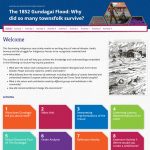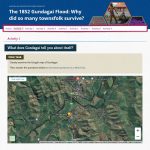Why did so many townsfolk survive?
Was this an example of conflict or cooperation?
Case Study Overview
This local history case study of the NSW town of Gundagai addresses the historical knowledge and understandings outcomes embedded in both the primary and secondary HASS/history curriculum:
- What were the nature and consequences of contact between Aboriginal peoples and Torres Strait Islander peoples and early explorers, settlers and traders?
- What followed from the extension of settlement, including the effects of contact (intended and unintended) between European settlers and Aboriginal peoples and Torres Strait Islander peoples?
- What is the nature and contribution made by different groups and individuals in the community?
- How did colonial settlement change the environment?
It also reveals an exciting story of natural disaster, death, bravery and the struggle for Indigenous heroes to be recognised and commemorated.
Format
This unit of study is presented as a website which includes a video, a virtual tour of the Gundagai Museum, on-line activities, and worksheets (in Word Doc format). The unit is compatible with computers and iPads.
Case Study unit of work inquiry structure
- Activity 1 What does Gundagai tell us about itself?
- Activity 2 How did townsfolk manage to survive the great Gundagai Floods of 1852? Was this an example of conflict or cooperation?
- Activity 3 Interpreting representations of the rescue
- Activity 4 Examining Literary Representations of an event
- Activity 5 Virtual discovery tour f the Gundagai Museum
- Activity 6 Victim Analysis
- Activity 7 Reflection Activity
- Activity 8 Extension Activity 1: Where would you create a settlement?
- Activity 9 Extension Activity 2: Would you be a good explorer?




